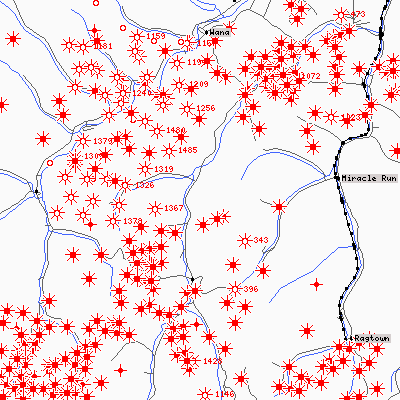|
 |
This map from the State Office of Oil and Gas web site shows crowded, un-spaced wells near the town of Miracle, in north central West Virginia. |
I. Introduction
This slide show will explain why West Virginia needs a statute that applies “forced” well spacing and royalty sharing, a.k.a. “pooling and utilization”, to all oil and gas wells drilled in the state. This is especially relevant at a time when so many new wells are being drilled.
Well spacing is particularly useful to encourage horizontal drilling, an emerging technology favored by surface owners. To learn more see Horizontal Drilling Marcellus (And Other) Shale Gas Wells, Why it Is Best and What Should Be Done about It.
Currently, for most oil and gas wells drilled in West Virginia, the laws regarding who owns the gas that comes out of oil or gas wells, and what this means about how many wells are drilled how close together, are based on a common-law principle stemming from hunting rights adopted by courts in England during the Middle Ages. This principle, the Rule of Capture, does not recognize the fact that the boundaries of oil and gas reservoirs (pools) do not follow property lines designated in deeds of mineral interests.
Oil and gas reservoirs are extensive pools that may extend under hundreds or even thousands of acres of land. Under the Rule of Capture, the first person to drill a well that taps into a pool of oil or gas has the ability to use, and possibly deplete, the oil or gas under not only their own property, but also under the property of neighboring mineral owners, and without paying anything to the neighbors for doing so!
Not only does the Rule of Capture’s authorize legalized stealing from neighboring mineral owners, the Rule of Capture has two further results that are bad for the rest of us. First, more gas wells than are necessary are drilled to get the gas out. Second, the drilling of these extra wells results in less total gas being produced from the pool!
That is why most other states already have well spacing and royalty sharing statutes, while West Virginia lags behind. For a list of statutes in other states see the annotations to West Virginia's code section declaring its purpose.
| Go directly to intro or slide: 1 2 3 4 5 6 7 8 9 10 11 12 13 14 15 16 17 18 19 20 21 22 23 24 24a 25 26 27 28 29 30 31 32 33 |